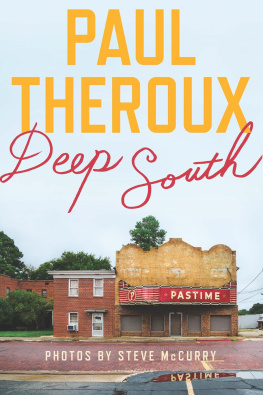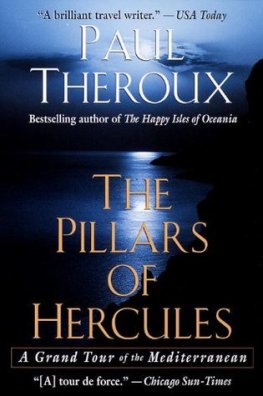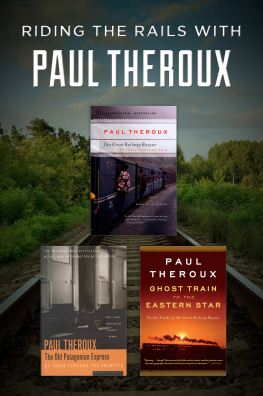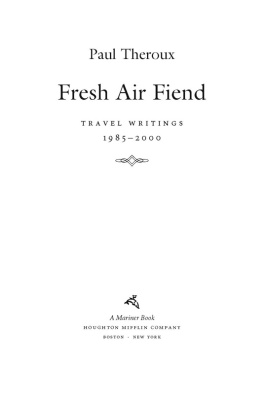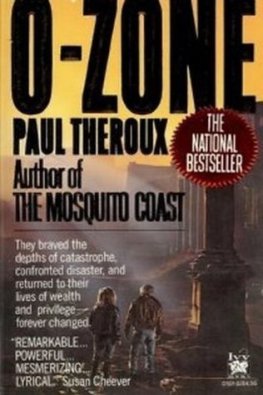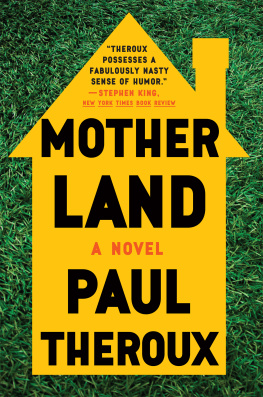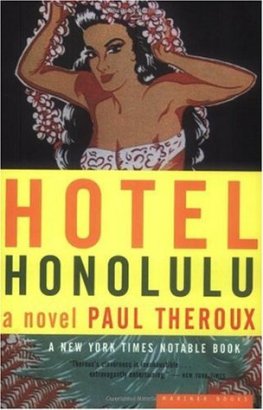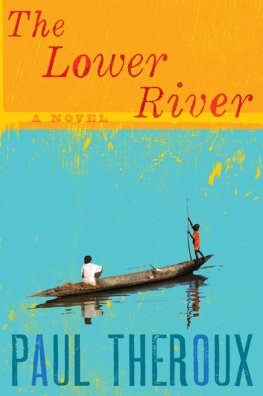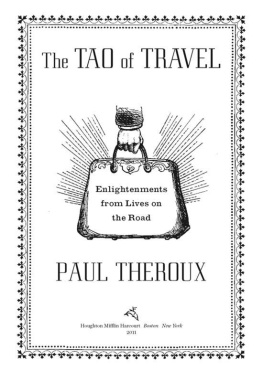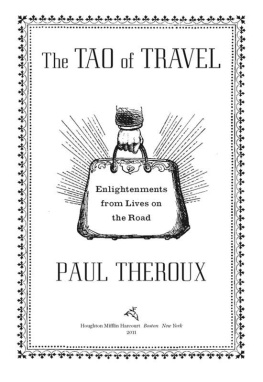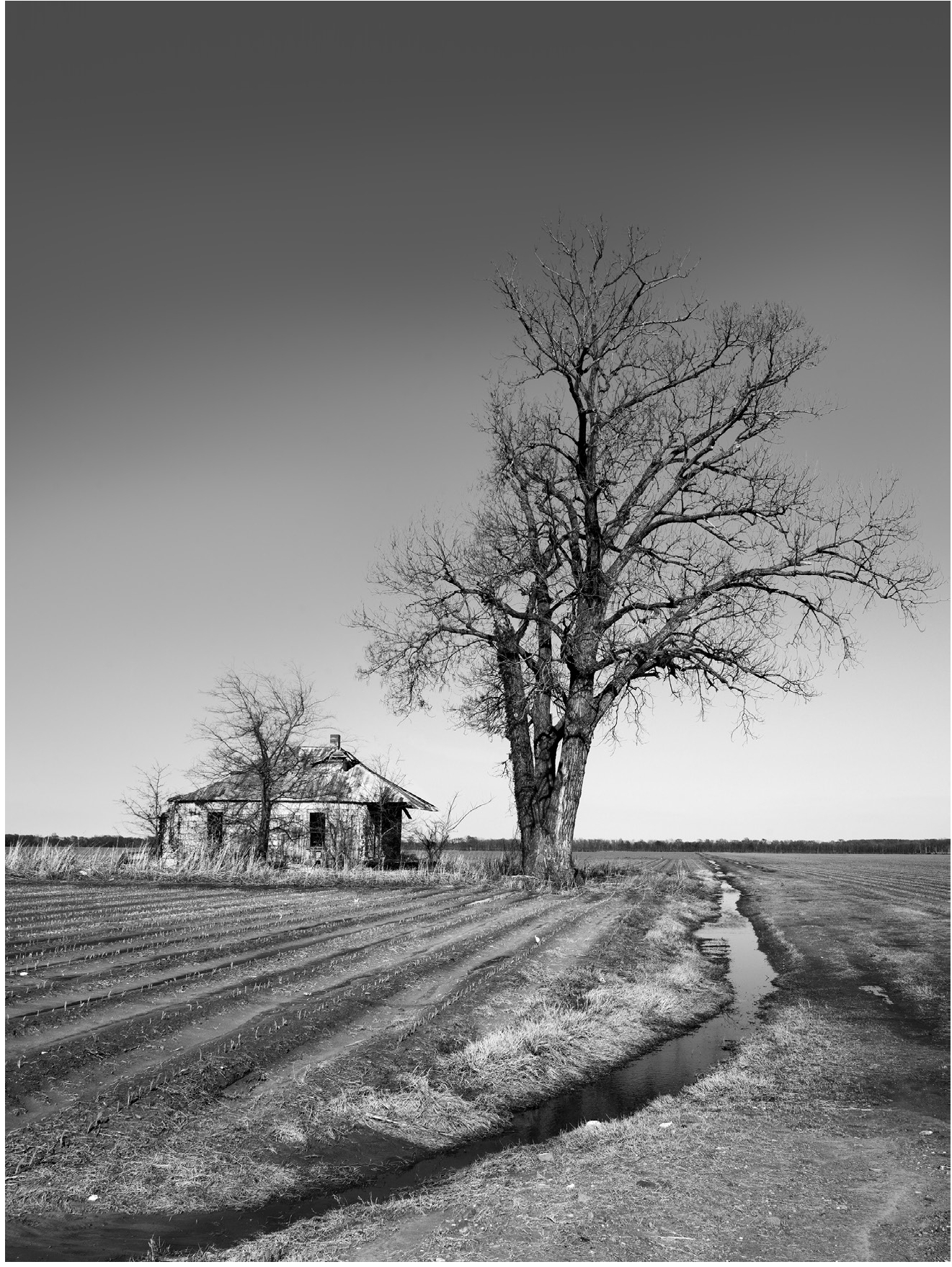Copyright 2015 by Paul Theroux
Photographs copyright Steve McCurry
All rights reserved
For information about permission to reproduce selections from this book, write to Permissions, Houghton Mifflin Harcourt Publishing Company, 215 Park Avenue South, New York, New York 10003.
www.hmhco.com
The Library of Congress has cataloged the print edition as follows:
Theroux, Paul.
Deep South : four seasons on back roads / Paul Theroux.
pages cm
Includes bibliographical references and index.
ISBN 978-0-544-32352-0 (hardcover : alkaline paper) ISBN 978-0-544-32353-7 (ebook) 1. Southern StatesDescription and travel. 2. Southern StatesSocial life and customs. 3. Southern StatesSocial conditions. 4. Southern StatesBiography. 5. Theroux, PaulTravelSouthern States. 6. Scenic bywaysSouthern States. 7. SeasonsSouthern States. I. Title.
F 216.2. T 45 2015
975dc23
2015006631
Portions of this book appeared in Smithsonian magazine.
Some names in the text have been changed in the interest of privacy.
Excerpt from The Arkansas Testament from The Poetry of Derek Walcott, 19482013, by Derek Walcott, selected by Glyn Maxwell. Copyright 2014 by Derek Walcott. Reprinted by permission of Farrar, Straus and Giroux, LLC.
Cover design by Mark R. Robinson
Cover photograph copyright Steve McCurry
v1.1015
To the memory of George Davis (19412013) of Medford, Massachusettsathlete, traveler, teacher, civil rights stalwart, unsung hero of Selmas Bloody Sundayin gratitude for fifty years of friendship
We felt like we were alone and couldnt make a difference. But what happened with the movement? People grouped together. It was a beautiful thing.
On the red clay roads of the African bush among poor and overlooked people, I often thought of the poor in America, living in just the same way, precariously, on the red roads of the Deep South, on low farms, poor pelting villages, sheepcotes, and millspeople I knew only from books, as Id first known Africansand I felt beckoned home.
The Last Train to Zona Verde: My Ultimate African Safari (2013)
In this preposterous, unclassifiable book of my Travels, the thread of the stories and observations does not so much break as become intertwined, and in such a manner that, I am fully aware, much patience is needed to unravel and trace it in such an untangled skein.
A LMEIDA G ARRETT (J OO B APTISTA D A S ILVA L EITO ), Travels in My Homeland (Viagens na Minha Terra, 1846)
PART ONE
Fall: You Gotta Be Going There to Get There
The stranger filleth the eye.
Arab proverb, quoted by Richard Burton, First Footsteps in East Africa (1856)
Be Blessed: Aint No Strangers Here
In Tuscaloosa, Alabama, on a hot Sunday morning in early October, I sat in my car in the parking lot of a motel studying a map, trying to locate a certain church. I was not looking for more religion or to be voyeuristically stimulated by travel. I was hoping for music and uplift, sacred steel and celebration, and maybe a friend.
I slapped the map with the back of my hand. I must have looked befuddled.
You lost, baby?
I had driven from my home in New England, a three-day road trip to another world, the warm green states of the Deep South I had longed to visit, where the past is never dead, so the man famously said. Its not even past. Later that month, a black barber snipping my hair in Greensboro, speaking of its racial turmoil today, laughed and said to me, in a sort of paraphrase of that writer whom hed not heard of and never read, History is alive and well here.
A church in the South is the beating heart of the community, the social center, the anchor of faith, the beacon of light, the arena of music, the gathering place, offering hope, counsel, welfare, warmth, fellowship, melody, harmony, and snacks. In some churches, snake handling, foot washing, and glossolalia too, the babbling in tongues like someone spitting and gargling in a shower stall under jets of water.
Poverty is well dressed in churches, and everyone is approachable. As a powerful and revealing cultural event, a Southern church service is on a par with a college football game or a gun show, and there are many of them. People say, Theres a church on every corner. That is also why, when a church is bombedand this was the fiftieth anniversary of the bombing of the sixteenth Street Baptist Church in Birmingham, where four little girls were murderedthe heart is torn out of a congregation, and a community plunges into pure anguish.
You lost?
Her voice had been so soft I had not realized shed been talking to me. It was the woman in the car beside me, a sun-faded sedan with a crushed and cracked rear bumper. She was sipping coffee from a carryout paper cup, her car door swung open for the breeze. She was in her late forties, perhaps, with blue-gray eyes, and in contrast to the poor car she was dressed beautifully in black silk with lacy sleeves, a big flower pinned to her shoulder, wearing a white hat with a veil that she lifted with the back of her hand when she raised the coffee cup to her pretty lips, leaving a puckered kiss-daub of purple lipstick on the rim.
I said I was a stranger here.
Aint no strangers here, baby, she said, and gave me a merry smile. The South, I was to find, was one of the few places Id been in the world where I could use the word merry without sarcasm. Im Lucille.
I told her my name and where I wanted to go, the Cornerstone Full Gospel Baptist Church, on Brooksdale Drive.
She was quick to say that it was not her church, but that she knew the one. She said the name of the pastor, Bishop Earnest Palmer, began to give me directions, and then said, Tell you what.
One hand tipping her veil, she stared intently at the rim of her cup. She paused and drank the last of her coffee while I waited for another word.
Shoot, its easier for me to take you there, she said, then used the tip of her tongue to work a fleck of foam from her upper lip. I dont have to meet my daughter for another hour. Just follow me, Mr. Paul.
I dogged the crushed rear bumper of her small car for about three miles, making unexpected turns, into and out of subdivisions of small bungalows that had been so hollowed out by a devastating tornado the previous year, they could accurately be described as fistulated and tortured. In the midst of this scoured landscape, on a suburban street, I saw the church steeple, and Lucille slowed down and pointed, and waved me on.
As I passed her to enter the parking lot, I thanked her, and she gave me a wonderful smile, and just before she drove on she said, Be blessed.
That seemed to be the theme in the Deep South: kindness, generosity, a welcome. I had found it often in my traveling life in the wider world, but I found so much more of it here that I kept going, because the good will was like an embrace. Yes, there is a haunted substratum of darkness in Southern life, and though it pulses through many interactions, it takes a long while to perceive it, and even longer to understand.
I sometimes had long days, but encounters like the one with Lucille always lifted my spirits and sent me deeper into the South, to out-of-the-way churches like the Cornerstone Full Gospel, and to places so obscure, such flyspecks on the map, they were described in the rural way as you gotta be going there to get there.
After circulating awhile in the Deep South I grew fond of the greetings, the hello of the passerby on the sidewalk, and the casual endearments, being called baby, honey, babe, buddy, dear, boss, and often, sir. I liked Whats going on, bubba? and How yall doin? The good cheer and greetings in the post office or the store. It was the reflex of some blacks to call me Mr. Paul after I introduced myself with my full name (a habit from slavery was one explanation). This was utterly unlike the North, or anywhere in the world Id traveled. Raging politeness, this extreme friendliness is sometimes termed, but even if that is true, it is better than the cold stare or the averted eyes or the calculated snub I was used to in New England.

